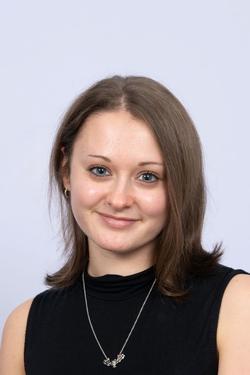Meet Early Career Microbiologist of the Year talk finalist: Emma Davies

What are your current research interests?
My research focuses on identifying host restriction factors that can inhibit coronaviruses. I’m especially interested in the OAS (2’-5’-oligoadenylate synthetase) family of genes, which play a well-known role in the immune response. The core mechanism of action of these proteins was discovered over 30 years ago, but we are still discovering new ways they can work! My project investigates how OAS2 inhibits the seasonal coronavirus HCoV-OC43 and why different isoforms of OAS2 show varying levels of antiviral activity.
How would you explain your research to a GCSE student?
When a virus infects a cell, the cell sends out a warning signal called interferon. Think of interferon like a person shouting, “An enemy is coming! Gather your weapons!”. It signals nearby cells to turn on special genes that make antiviral proteins.
These antiviral proteins can be highly specific and may only work against one type of virus. My job is to identify which of these antiviral proteins can target coronaviruses, like the one that caused COVID-19, to help prevent them from spreading.
What advice would you share with someone interested in working in this field?
My advice for anyone wanting to be a microbiologist, or any kind of scientist, is don’t be afraid to run with an idea. Sometimes you’ll think of an experiment but hesitate because it seems a bit out there, not urgent, or your colleagues don’t think it’s worth doing. But some of the most interesting results from my research have come from side experiments I’ve set up out of curiosity, then ended up changing the whole direction of my project.
How do Society events, such as Annual Conference, promote your professional development?
I think the Microbiology Society’s Annual Conference is one of the best opportunities for an early-career researcher to present their work! I’m fortunate to have been offered an oral talk two years in a row, and sharing my research with such a supportive audience has really improved my presentation skills. Discussions with other scientists afterwards have sparked new ideas for my research and helped me shape my project. The events are also a great place to network and find out about the exciting microbiology research that is happening in the UK and the rest of the world.
What do you love most about your job?
To me, scientific research feels a bit like storytelling. When I’m planning and executing experiments, it’s as if I’m trying to write the next chapter in a story, and I still don’t know how it will end. What I love the most is seeing the results and realising something new about my antiviral protein, a discovery that I may be the only person in the world to know! Seeing that story come together with time, even with the failed experiments and unexpected results, is incredibly rewarding, especially when I’m surrounded by a fantastic team of scientists.
